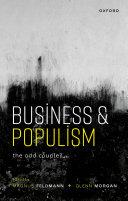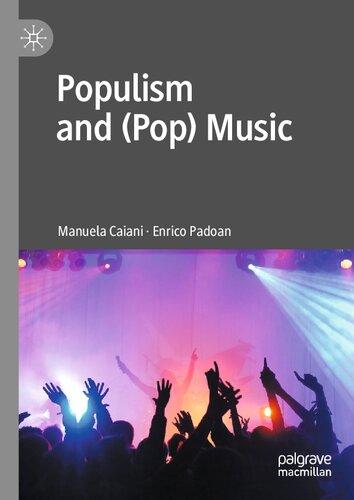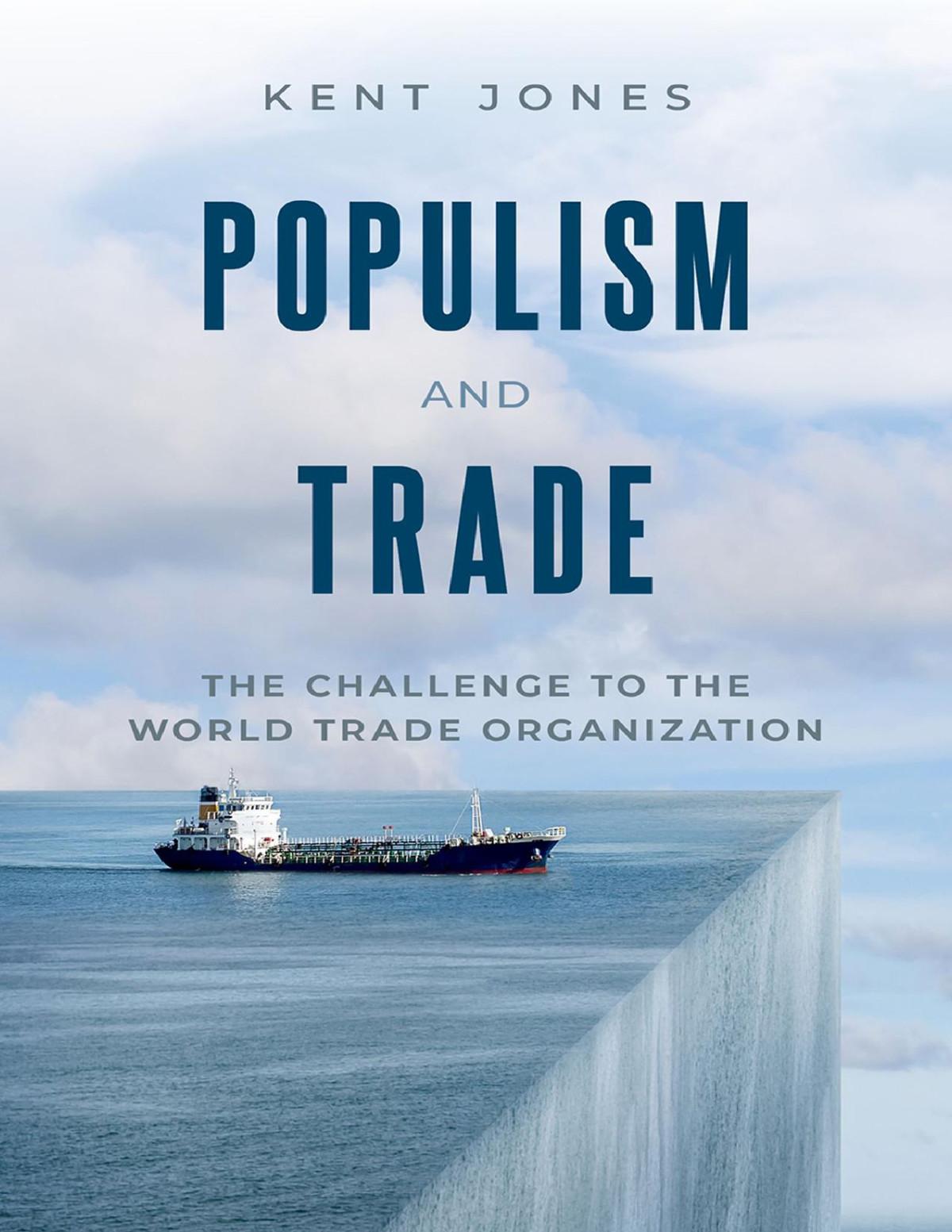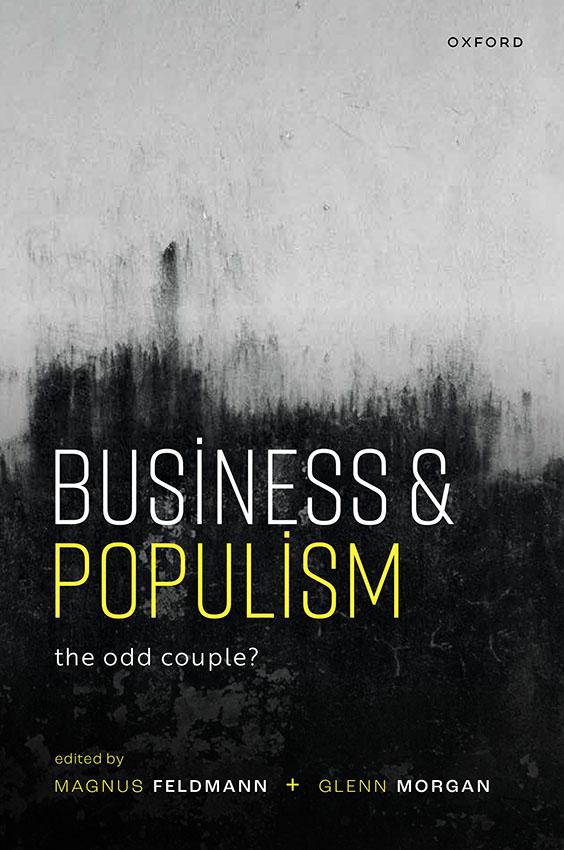Business
and Populism: The Odd Couple? Magnus Feldmann
Visit to download the full and correct content document: https://ebookmass.com/product/business-and-populism-the-odd-couple-magnus-feld mann/
More products digital (pdf, epub, mobi) instant download maybe you interests ...
The
Odd Quantum Treiman
https://ebookmass.com/product/the-odd-quantum-treiman/
The Couple Upstairs Holly Wainwright
https://ebookmass.com/product/the-couple-upstairs-hollywainwright/
Environment and Society 1st ed. Edition Magnus Boström
https://ebookmass.com/product/environment-and-society-1st-ededition-magnus-bostrom/
The Golden Couple Greer Hendricks & Sarah Pekkanen
https://ebookmass.com/product/the-golden-couple-greer-hendrickssarah-pekkanen/
Couple relationships in the 21st century Fink
https://ebookmass.com/product/couple-relationships-in-the-21stcentury-fink/
Magnus (3-Vikingos) 1ª Edition Emma Madden
https://ebookmass.com/product/magnus-3-vikingos-1a-edition-emmamadden/
Populism and (Pop) Music Manuela Caiani
https://ebookmass.com/product/populism-and-pop-music-manuelacaiani/
The Practice of Emotionally Focused Couple Therapy: Creating Connection 3rd
https://ebookmass.com/product/the-practice-of-emotionallyfocused-couple-therapy-creating-connection-3rd/
Populism and Trade Kent Jones [Kent Jones]
https://ebookmass.com/product/populism-and-trade-kent-jones-kentjones/
Business and Populism
Business and Populism
The OddCouple
Editedby
MAGNUS FELDMANN AND
GLENN MORGAN
Great Clarendon Street, Oxford, ox2 6dp, United Kingdom
Oxford University Press is a department of the University of Oxford. It furthers the University’s objective of excellence in research, scholarship, and education by publishing worldwide. Oxford is a registered trade mark of Oxford University Press in the UK and in certain other countries
© the several contributors 2022
The moral rights of the authors have been asserted
Impression: 1
All rights reserved. No part of this publication may be reproduced, stored in a retrieval system, or transmitted, in any form or by any means, without the prior permission in writing of Oxford University Press, or as expressly permitted by law, by licence, or under terms agreed with the appropriate reprographics rights organization. Enquiries concerning reproduction outside the scope of the above should be sent to the Rights Department, Oxford University Press, at the address above
You must not circulate this work in any other form and you must impose this same condition on any acquirer
Published in the United States of America by Oxford University Press 198 Madison Avenue, New York, NY 10016, United States of America
British Library Cataloguing in Publication Data
Data available
Library of Congress Control Number: 2023930419
ISBN 978–0–19–289433–5
DOI: 10.1093/oso/9780192894335.001.0001
Printed and bound by
CPI Group (UK) Ltd, Croydon, CR0 4YY
Links to third party websites are provided by Oxford in good faith and for information only. Oxford disclaims any responsibility for the materials contained in any third party website referenced in this work.
Preface
This book arose from conversations between the two editors during the Brexit referendum campaign in 2016 and after Trump’s victory in the 2016 presidential campaign. From the start, these discussions reflected our shared interest in political economy and also our different but complementary disciplinary backgrounds—in business and management on the one hand and political science on the other. As a result, the conversations began to focus on the role of business in relation to these upheavals in the politics of the UK and the US. In both cases it was clear that contrary to the expectations in much of the theoretical literature on the structural and instrumental power of business, business had been largely ineffective in shaping these processes, with many businesses failing to achieve their goals and left subject to the risks and uncertainties that populist leadership tends to bring. In some cases, the controversy surrounding populism also sparked new divisions between businesses. Once we explored these questions in more detail, it quickly became apparent that there were very few discussions of the interaction of business and populism in the relevant literature. We therefore decided to draw together contributors from different disciplines to provide detailed accounts of this relationship in a range of countries and across a range of themes. We were able to convene a mini-conference at the virtual annual meeting of the Society for the Advancement of SocioEconomics in 2020, where a number of contributors presented first drafts and discussed each other’s contributions. From this point a series of drafts and redrafts followed as various common themes and issues emerged from different disciplinary and geographical
perspectives. We would like to acknowledge and thank most sincerely the contributors for their efforts at working with us and their patience as the pandemic disrupted our various timetables for completion. We hope they will think the final volume has been worth the effort.
The editors would also like to thank the University of Bristol and our respective departmental homes, the School of Management and the School of Sociology, Politics, and International Studies for their support. Glenn Morgan would particularly like to thank Andrew Sturdy for his encouragement and support for this project as well as acknowledging his intellectual debts to his long-standing collaborators, Richard Whitley and Peer Hull Kristensen, both of whom would, in their different ways, no doubt find plenty to disagree with in this book! Magnus Feldmann would like to thank Michelle Cini and Mark Wickham-Jones at Bristol for their support. He would also like to acknowledge his gratitude to Honorata Mazepus, Mircea Popa, and Daniel Kinderman for productive research collaborations on related topics, which have influenced his thinking on these issues.
Finally, we would like to acknowledge the patience of our editor at Oxford University Press, Adam Swallow, who has shown willingness to adjust our timetable and the word length as the project has developed and grown.
Contents
ListofTables
ListofFigures
ListofContributors
PART 1. INTRODUCTION
1. Business and Populism: The Political Economy of the ‘Odd Couple’
MagnusFeldmannandGlennMorgan
PART 2. COUNTRY STUDIES
2. The Trump Phenomenon and Right-wing Extremism: Is Donald Trump a Populist?
MarkS.MizruchiandRaulGălan
3. Threats and Opportunities: The Populist Challenge to Business Elites in Trump’s Administration
MatthewJ.Baltz
4. Brexit, Populism and Business: The Business Elite Loses Control?
MagnusFeldmannandGlennMorgan
5. Business Reponses to Populism in Denmark: Between Loud Voice and Implicit Loyalty
ChristianLyhneIbsen
6. Italy: Populism and Business in a Stagnant Economy
DavideVampa
7. Rent-seeking Business Elites and Populism in Poland and Hungary
MiklósSzanyi
8. Business Factions, Populists, and the Social Bloc Perspective: The Case of FDI-led Growth Regimes
CornelBan
9. India: Populism, Personalism, and Economic Governance
AndrewWyatt
10. Technocracy and Populism in the Philippines
YusukeTakagi
11. Populist ‘Order and Progress’: Authoritarianism and Loyal Business Elites in Brazil
RodriguesSilva
PART 3. THEMATIC ANALYSES
12. Right-wing Populism vs. Climate Capitalism: Climate Change
Governance Under Scrutiny
MarcusGomesandSteffenBöhm
13. Business Associations and Right-wing Populism
DanielKinderman
14. Populists in Power—the Impact on Interest Representation and Firm-level Nonmarket Strategies
DorottyaSallai
15. Populism and Trade
LouiseCurranandJappeEckhardt
16. The Populism of Transnational Plutocrats
BrookeHarrington
PART 4. CONCLUSION
17. Populism, Risk and Business: Present and Future Prospects MagnusFeldmannandGlennMorgan
Index
List of Tables
1.1. Initial variants of populism—from thin-centered ideologies to specific programmes.
1.2. A typology of business responses to populism.
5.1. Organized employers in Denmark—in percent.
5.2. Socio-demographics of DPP voters in 2020.
6.1. Trust in European Union Institutions in 2019 (%, difference with 2008 in brackets).
6.2. Difference between party support in one category and overall party support.
6.3. Is immigration positive or negative for the economy (2017)?
10.1. Top 10 richest people in the Philippines in 2020, 2010, and 2006.
13.1. Swiss EEC/EU-related Referenda and their Outcomes.
14.1. Type of bargaining and business power in the different phases of populism.
14.2. Quiet CPA activities in relation to buffering and bridging strategies and monetary contributions.
14.3. Legitimacy and quiet CPA engagement of firms in ‘bad’ and ‘good’ FDI sectors.
15.1. Interviews undertaken for this project.
17.1. Risks to business from right-wing populism: Scale and scope.
List of Figures
5.1. Electoral results of the DPP 1998–2022.
10.1. Ease of doing business ranking.
10.2. Credit rating.
List of Contributors
Matthew J. Baltz
mjb077@bucknell.edu
Department of Sociology & Anthropology, Bucknell University
Cornel Ban cba.ioa@cbs.dk
Department of Organization, Copenhagen Business School
Amon Barros amon.barros@fgv.br
EAESP, FGV, Sao Paulo, Brazil
Steffen Bohm
s.boehm@exeter.ac.uk
University of Exeter Business School, University of Exeter
Louise Curran
l.curran@tbs-education.fr
Toulouse Business School Education, Department of Strategy, Toulouse, France
Heike Doering
DoeringH@cardiff.ac.uk
Cardiff Business School, Cardiff University
Jappe Eckhardt jappe.eckhardt@york.ac.uk
Department of Politics, University of York
Magnus Feldmann
M.feldmann@bristol.ac.uk
School of Sociology, Politics, and International Studies, University of Bristol
Raul Galan
rgalan@umich.edu
Department of Sociology, University of Michigan
Brooke Harrington
Brooke.Harrington@dartmouth.edu
Department of Sociology, Dartmouth College
Christian Lyhne Ibsen cli@faos.dk
University of Copenhagen, Department of Sociology/FAOS
Daniel Kinderman kindermd@udel.edu: dpk@cornell.edu
Department of Political Science and International Relations, University of Delaware
Mark Mizruchi mizruchi@umich.edu
Department of Sociology, University of Michigan
Glenn Morgan glenn.morgan@bristol.ac.uk
School of Management University of Bristol
Caroline Rodrigues Caroline.rodrigues@hotmail.com
EAESP, FGV, Sao Paulo, Brazil
Dorottya Sallai d.sallai@lse.ac.uk
Department of Management, London School of Economics
Miklos Szanyi
szanyi100@gmail.com
Szeged University, Faculty of Economics and Business Administration, Institute of Finance and International Economic Relations
Yusuke Takagi
y-takagi@grips.ac.jp
National Graduate Institute for Policy Studies (GRIPS), Tokyo, Japan
Davide Vampa
d.vampa@aston.ac.uk
Aston University, Department of Politics, History and International Relations
Andrew Wyatt
A.K.J.Wyatt@bristol.ac.uk
School of Sociology, Politics, and International Studies, University of Bristol
1 Business and Populism
The Political Economy of the ‘Odd Couple’
Magnus Feldmann andGlenn Morgan
Introduction
In 2018, Boris Johnson, then UK Foreign Secretary and later Prime Minister, was reported to have said ‘Fuck Business’ in response to questions concerning the response of British companies to Brexit. This was not a one-off comment. Four years later, Financial Times commentator, Robert Shrimsley (2021), wrote at the time of the Conservative Party conference in October 2021 ‘when Boris Johnson said “fuck business”, he really meant it. The defining characteristic of this week’s Conservative conference has been a unified assault on companies who are failing to adapt to a new economic model’ (see also Anderson 2019). How did the ‘natural’ party of business become so anti-business? In the US, Yahoo! Finance calculated that within 3 months of entering the White House, Donald Trump had used Twitter to criticize by name 62 US companies (Wolff-Mann, 2017). Throughout his administration, he name-checked a wide range of the largest US companies to criticize them for amongst other things,
offshoring their production, closing US plants, giving away their intellectual property, weakening US security, and undermining individual freedom of speech (a criticism particularly aimed at Facebook and Twitter as they ‘fact-checked’ his posts and eventually took him off their platforms). In the summer of 2020, Trump’s Attorney-General, William Barr, discussing the growing trade and diplomatic Cold War with China, stated that ‘the American business community has been a big part of the problem’. Adam Tooze commented that ‘Barr came remarkably close to pronouncing a divorce between his ideal of America and actually existing American capitalism’ (Tooze, 2021: 218). As in the UK, the traditional party of business, in this case the Republicans, was attacking business. In India, supporters of Prime Minister Modi’s right-wing Bharatiya Janata Party (BJP) have called Infosys (the Indian company which is one of the largest software companies in the world) ‘anti-national’ for letting down the tax system. The finance ministry ‘summoned’ the chief executive officer (CEO) of Infosys about technology issues publicizing its concern through extensive Twitter activity. In August 2021, the BJP commerce minister publicly lambasted the $106 billion Tata group for criticizing the proposed strict rules for e-commerce and said local businesses should not just think about profits. Previously, Modi’s actions to demonetize the Indian economy, by taking 86% of cash in the form of large bills out of circulation, was made against the advice of business and experts leading to the eventual resignation of the Raghuram Rajan, the internationally renowned University of Chicago economist who had been Governor of the Indian Central Bank (Jafrelot, 2021). Modi’s decision caused chaos for businesses and consumers over a period of months (see Business Today, 2021, see also Wyatt’s Chapter 9 on Modi’s relationship to business). In Hungary, Prime Minister Orbán instituted rules and regulations with the explicit goal of pushing out of Hungary multinational banks and utilities (Bohle and Regan, 2021). Once again, a right-wing government acted in ways which
damaged the interests of certain powerful businesses. The idea that right-wing parties are invariably supporters of, if not subservient to, business has therefore been confounded across the globe as populists have taken over mainstream conservative parties or launched new right-wing movements going out of their way to attack business as part of a corrupt ‘establishment’ that benefits at the expense of ‘the people’.
The purpose of this book is to explore the nature of the complex relations between business and right-wing populists across a range of countries and issue areas. For some decades, research has emphasized the power of business to get its own way on major issues of economic policy as a result of its power over key resources (such as capital), over politics (by funding parties), and over legislatures (by its use of lobbying and its access to the sort of expertise necessary for modern government policy formulation and implementation) (Culpepper, 2011). Right-wing governments and right-wing parties have been an essential part of this process. How is it that this set of connections is under threat? Why do right-wing populistparties that express their general support for capitalism and for business direct much of their rhetoric against business? What is business doing in response to these threats? Should it voice its opposition to the rise of these right-wing populists and their more damaging policies or should it loyally accommodate itself to the new situation either by keeping its head down or by collaborating with populists and actively supporting them? Such decisions involve businesses in assessing various risks to their strategies in the present and how these risks might develop in the future. As we show in this book, assessing this risk is complex in part because populism is in Mudde’s (2004) classic definition a thin-centred ideology (see also Mudde and Kaltwasser, 2017; Rovira Kaltwasser et al., 2017); it is not associated with a distinctive policy programme in the way that social democratic or conservative ideologies tend to be. Beyond certain core elements identified in more detail below, it
accrues ideas and policies over time that are neither internally coherent nor necessarily anything more than instant responses to crises and electoral opportunities. Tracking the nature of the populist challenge to business in any particular context requires therefore an understanding of the shape-shifting nature of this phenomenon and the degree of variation between populist movements and business responses in different countries.
In this introductory chapter, drawing on the chapters that follow in the book, we aim to describe in detail the dilemma facing business in dealing particularly with right-wing populism. We begin by discussing what we mean by populism and why this volume focuses on rightwing populism in particular. We then elaborate on the nature of the dilemma facing business in terms of different variants of right-wing populism. We emphasize that right-wing populism often attacks business, but on the other hand it is mainly committed to markets, competition, limited regulation, and low taxes. Business responses to populism therefore depend on the balance between these two elements in any particular context and their impact on existing business strategies. As the chapters in the book show, this balance varies across countries, as does the degree to which other key aspects of populism, such as its critique of liberal democratic political institutions and the values of liberal cosmopolitanism, are emphasized. Such differences influence the degree of risk perceived by business and therefore also business responses. We frame our discussion of business responses by developing and modifying Hirschman’s exit, voice, and loyalty framework (Feldmann and Morgan, 2022; Hirschman, 1970).
Populism: Definitions and debates
Echoing Marx and Engels, various scholars have described populism as a spectre haunting Europe or even the world (e.g. Albertazzi and
McDonnell, 2008; Mushaben, 2020; Moffitt, 2016), whilst at the same time acknowledging a certain definitional vagueness and somewhat divergent uses of the term (Urbinati, 2019). However, most academic studies tend to agree that the juxtaposition of the ‘true and authentic people’ on one side and the distant and ‘corrupt elite’ on the other is central to populism. Populist movements claim to speak directly on behalf of the people (Canovan, 1981, 2005; Mudde and Kaltwasser, 2017; Müller, 2018, 2021; Weale, 2018) as expressed in majoritarian institutions such as elections and referenda. They frequently reject intermediary institutions such as the law, the civil service, parliamentary rules and conventions on the grounds that these are non-majoritarian, unaccountable to ‘the people’ and rigged in favour of the elite.
For some authors, such as Laclau (2005), populism is a necessary part of any politics that seeks to challenge the status quo; by giving voice to the people, it challenges established hierarchies and opens up the possibility of radical change. For others, populism’s claim to speak for the people ignores the complexities of legitimate differences between groups and parties and the development of liberal institutions that facilitate debate, disagreement and compromise as well as defending certain rules of the game in a democracy, e.g. free speech, a free press, judicial institutions that protect the rule of law, electoral institutions that monitor the fairness of electoral processes, the existence of constitutions with rules and procedures including the protection of the rights of minorities. From this perspective, the populist effort to undermine or close down intermediary institutions is a threat to democracy as whole (Applebaum, 2020; Levitsky and Ziblatt, 2018; Müller, 2021: Mudde, 2021). For Laclau, who seeks to rehabilitate left-wing forms of populism such as have been common in Latin America over the last decades (Conniff, 1999; de la Torre, 2017) and as have emerged more recently in Europe and the US (Prentoulis, 2021; Tamames, 2020; Tormey, 2018, 2019), populism per se is inherently an ‘empty
signifier’ in the sense that it says nothing about the content of this challenge itself. Populism may, therefore, be part of either left-wing or right-wing political movements. Mudde’s argument (Mudde, 2021) that populism is a thin-centred ideology similarly implies that the populist label may not say very much about the substance of policy and therefore has to be combined with a variety of other ideologies, such as conservatism or socialism, and other policies in order to develop an electoral appeal. In this way, populisms gain further programmatic content, but the programme may not be coherent, and policies may shift and change quickly depending on circumstances and reflect evolving strategic objectives of the populist leader (Weyland, 2017).
These approaches imply the importance of recognizing that there exist ‘varieties of populism’ depending on how particular forms of populism are translated into specific policy agendas. A key aspect of this is how populists articulate their view of who constitutes the ‘people’ and who constitutes ‘the elite’. A basic distinction is often made, for example, between definitions of the ‘people’ which are inclusionary versus those which are exclusionary (Filc, 2015; Kapiszewski et al., 2021 Mudde and Kaltwasser, 2013). Inclusionary definitions of the people seek to appeal to a common sense of identity based on shared economic experience and broadly shared values in favour of a more equal society in terms of wealth, income and power. The 99% versus the 1% slogan used to rally people against inequalities in the Occupy Movement in US after the global financial crash reflects this dynamic and shows how left-wing populism primarily attaches to ideas about curbing inequalities, reducing the power of markets, and increasing the power of the state in redistribution and welfare. Inclusionary populists tend to see similar divisions between the people versus elites in other countries because of the central role of capitalism as an exploitative force in their analysis. They are therefore reluctant to use border control issues, immigration, and cultural differences as ways of gaining
support and defining the ‘people’. They prefer to emphasize their internationalism and to include a whole range of struggles against exploitation at home and abroad as part of their mission. They retain the common populist approach of rejecting anti-majoritarian or nonelected institutions as they are seen as controlled by the moneyed and privileged elite and acting as constraints on populist power. By contrast, exclusionary definitions of the people tend to confine the definition of the people to some core group in society, defined by ethnic, racial, religious or ‘nativist’ commonalities, that are linked with cultural attitudes and values that are claimed to be historically embedded and performed through the everyday life of an authentic member of the people of a particular ‘nation’ (Brubaker, 2020). The elite may lack these shared characteristics or may have become disconnected from the attitudes and values of the mass of the people, by becoming more ‘cosmopolitan’ ‘citizens of nowhere’. In right-wing populist discourse, the elites are seen to favour and cultivate support from other groups that similarly lack this attachment to the authentic identity of the people, i.e. immigrants, members of minority religions or ethnic groups, by providing them with benefits that are labelled as unfair to the rest of the local population. Therefore, the target of exclusionary populists becomes a wide group, some of whom could be viewed as elite actors, but many others are defined as enemies of the people on the basis of ascribed racial characteristics, ethnicity, religion, and their presumed values and attitudes towards national identity. Exclusionary populism’s elective affinity is with right-wing voters, especially those influenced by traditionalist understandings of identity.
A further aspect of how populism’s thin-centred ideology can be fleshed out to attract support can be seen in Tugal’s recent survey article which identifies three families of approaches to populism (Tugal, 2021; see also Berman, 2021), each of which can be attached to either left-wing inclusionary or right-wing exclusionary populism. The first is the focus on the centrality of economic
grievances and crises in stimulating a backlash against markets or globalization. These approaches highlight a range of structural trends, such as the decline of Fordism and the rise of neoliberalism, rising inequality, globalization, and associated socio-economic and demographic shifts, and analyse the ways in which they contribute to insecurity and grievances (Franzese, 2019; Iversen and Soskice, 2019; Rodrik, 2018). For left-wing populism, such grievances are linked to a critique of capitalism and the need for actions to curb inequality on a national and global scale. For right-wing populism, economic grievances are coupled with cultural grievances and point to the need to exclude certain groups from the definition of the people and to privilege national sovereignty over global economic forces (protectionism, selective industry support, curbing the power of multinationals) coupled with what is described as ‘welfare chauvinism’, i.e. prioritizing the rights of the ‘native’ population to welfare benefits, education, housing, health, and other forms of state support.
The second set of issues which become incorporated in different ways into populism is the critique of political representation with a focus on political institutions and the imperfections of democratic representation. This reflects the increasing consensus amongst mainstream parties from the 1990s onwards on neoliberal policies, leading to a hollowing out of the choices that electorates face, and an avoidance and silencing of debates over certain areas such as immigration, the role of supranational regulation and free markets, and their consequences for inequalities (Berman and Kundani, 2021; Crouch 2006; Grzymala-Busse, 2019a, 2019b; Mair, 2013). As disillusionment amongst the electorate deepens, as reflected in declining electoral participation, anti-system parties seize the opportunity to mobilize against the system and to convert apathy and disillusionment into votes (Bale and Kaltwasser, 2021; De Vries and Hobolt, 2020; Hopkin, 2020). The crisis of democracy and the rise of populism is associated with new parties and movements or
takeovers of existing parties. Drawing on the core distinction between the people and the elite (plus its clients) populist parties claim to ensure genuine representation of the ‘people’ by focusing on issues on which the main parties have been silent. For left-wing populists, the political system has been corrupted by the power of money allowing elites to buy influence over the state and government policy through lobbying, through manipulation of key media sources, through funding political parties and think-tanks as well as supporting election campaigns of parties advancing neoliberal elite agendas. Thus, the political system becomes weighted against the 99% in favour of the 1% (or even the 0.1%). Right-wing populists, by contrast, portray the state and government policy as increasingly captured by elites and experts that are out of touch with ‘the people’; the elites are seen to shore up their electoral support by offering benefits to their clients or privileged minorities beyond those available to ‘the people’. They justify this in terms of liberal cosmopolitan values that disadvantage the ‘native’ population, disparage traditional cultural identities and empower intermediary institutions such as the judiciary or independent central banks that insulate the government from the ‘people’. Right-wing populists develop and extend this critique of the political system to justify their attack on political institutions and conventions on the basis that the current form of democracy fails to give voice to the ‘will of the people’. This critique of institutions and elites is often bound up with evocations of conspiracies, as highlighted by Muirhead and Rosenblum’s (2019) account of the new conspiracism in the US context.
Finally, populism’s thin-centred ideology is filled by what Tugal calls the ‘discursive, performative and ideational’. From this point of view, populism performs a particular style of politics, one that seeks to respond to and build the ‘anger’ of the people (Lonergan and Blyth, 2020) to demonstrate an authenticity in its claims to represent ‘the people’ as opposed to mainstream politicians who conform to
norms of behaviour, language and appearance which continuously reveal their aloofness and inauthenticity. The way in which populists demonstrate their authenticity can vary. Styles of language and personal appearance contribute to this; populists may seek to speak like ‘the people’ with few inhibitions about swearing or lying, dress like the people, live like them (Moffitt, 2016, 2020). They make obvious and high-profile efforts to connect to their electoral base by using symbols of their vision of ‘the people’, e.g. Trump waving the bible in front of the church at Lafayette Square opposite the White House during the Black Lives Matter protests in June 2020 or Bolsonaro being photographed frequently with guns and rifles. This also leads to a focus on the role of leadership and the association of populist movements predominantly with charismatic strong leaders (a process that occurs within both left- and right-wing populists: e.g., left-wing populism in Latin America has frequently been associated with personalistic leadership, both in earlier cases like Juan Perón in Argentina and in more recent examples like Hugo Chávez in Venezuela or Evo Morales in Bolivia). Left- and right-wing performative populism is differentiated by the sort of authenticity that is evoked and the key symbols of the authenticity that they aspire to. In right-wing populism, images of guns and violence have been used to demonstrate an authentic connection and a tough approach to crime in the US, Brazil and the Philippines (see Chapter 7 by Doering et al. and Chapter 11 by Takagi in this book; also on Brazil, Lapper, 2021; Putzel, 2020; on the Philippines,; Ramos, 2021; Thompson, 2022). Evoking religion on the grounds that it is a central part of the identity of the ‘people’ is also common in right-wing populism (e.g. Trump, Orbán, Modi, Bolsonaro). Demonstrating conspicuous personal wealth as in the case of Trump and Berlusconi was a way of suggesting that their leadership skills could be transferred from the business sphere to the political level. Whilst right-wing populists also stress traditional gender norms and are mostly led by men, it should be noted that women have led such
movements in various countries, including Marine Le Pen in France, Frauke Petry in Germany, Pia Kjærsgaard in Denmark, Siv Jensen and Sylvi Listhaug in Norway, and Riikka Purra in Finland. Left-wing populism, by contrast, emphasizes how their leaders share the same material standards, social backgrounds, and commitments to egalitarian and socialist values without recourse to issues of religion or ethnic identity (see e.g. the Podemos leadership group and the way in which Pablo Iglesias in particular authenticated himself as a man of the people: Tamames, 2020).
In summary, populist movements may have a thin-centred ideological core, but they rapidly develop more detailed policy agendas as parties and leaders begin to establish their identities across a variety of issues in contrast to mainstream parties and politicians (see Table 1.1). Our approach to populism, therefore, could be described as eclectic as it draws on insights from each of the three approaches identified by Tugal (2021), i.e. the structural, institutional, and performative. We agree with Berman (2021) on the need to consider not only structural determinants on the demand and supply side of politics, including economic grievances and crises of representation, but also to incorporate the role of agency and mobilization, for which the performative dimension is critical. Whilst there are some core elements that are necessary for the label ‘populism’ to be usefully attached to a movement, party or leader, the specific manifestations of those elements will vary across different countries and different periods of history depending on how economic, political, and cultural legacies and contexts (Urbinati, 2019) interact with contemporary challenges.
Table 1.1 Initial variants of populism—from thin-centered ideologies to specific programmes.
Necessary elements in the identification of populism
Definition of the people
Manifestations in leftwing populism
Inclusionary including international solidarity
Manifestation in rightwing populism
Exclusionary by race, ethnicity, religion
Definition of the elite 1%; wealthy economic groups The establishment in politics, economics and culture
The centrality of discourses around structural inequalities between the people and the elite reflected in loss of jobs, regional decline, growing inequality and rise of super wealthy
A critique of existing Institutional political deficiencies: convergence of mainstream parties; lack of choice; hollowing out of democracy
Caused by capitalism and globalization
Democracy perverted by the power of money to buy influence
Caused by government commitment to free trade leading to outsourcing, globalization and loss of home based jobs
A distinctive style of language accompanied by performative elements that appeal to the people for whom existing politicians and policies are no longer authentic
Leaders as authentic representatives of the people demonstrated by their material living conditions. Language and values of solidarity within society and across societies in terms of internationalism
Democracy no longer the ‘voice of the people’; establishment elite captured power and protect it through nonmajoritarian intermediary institutions
Leaders perform their authenticity through their language, their personal wealth and their messaging with appeals to traditional cultural values: guns, religion, race, and ethnicity
This approach has two implications for our edited book. Firstly, we do not seek to enforce a single view of what constitutes either leftwing or right-wing populism. Some chapters in the book, such as Wyatt’s Chapter 9 on India, Takagi’s Chapter 11 on the Philippines, or Mizruchi and Galan’s Chapter 2 on the US, express reservations
about the applicability of the term ‘populist’ to aspects of their cases. Such reservations largely reflect different emphases in the nature of the populist movement under examination and the way in which the elements we identify may combine with other more traditional political processes, e.g. when populist politicians adopt novel mobilization strategies, but pursue more traditional conservative economic policies. Similar reservations can arise when focusing too strongly on particular individual politicians and whether they are in some sense ‘populist’, e.g. Andrej Babiš in the Czech Republic, Boris Johnson in the UK, Silvio Berlusconi in Italy, even Donald Trump in the US, perhaps especially when policy and rhetoric are not fully aligned. What is common is that all the cases considered in this volume exhibit many of the populist characteristics which we have identified and can be viewed as part of the global populist turn in the first decades of the twenty-first century (Tugal, 2021). Whilst the relative emphases of individual chapters vary somewhat, all of them focus on the role played by the emergence of a form of politics that emphasizes the failure of mainstream parties to resolve issues about structural inequality, the hollowing out of democracy (Mair, 2013) and the need for the authentic voice of ‘the people’ to be heard. The chapters consider structural and economic factors, whilst also addressing institutional and discursive dimensions of the populist movements.
Secondly, this volume seeks to maintain a balance between the structural determinants that open up space for populism and the role of agency in realizing that possibility. Populism does not automatically arise as a result of particular circumstances. There is no automatic transmission from economic and institutional challenges to populist success. Instead, this requires the building of challenger parties (De Vries and Hobolt, 2020), the development of a sense of crisis and a noisy politics (Culpepper, 2011, 2021; Morgan and Ibsen, 2021) that activates potential supporters and keeps them mobilized for key events such as elections and referenda. This














